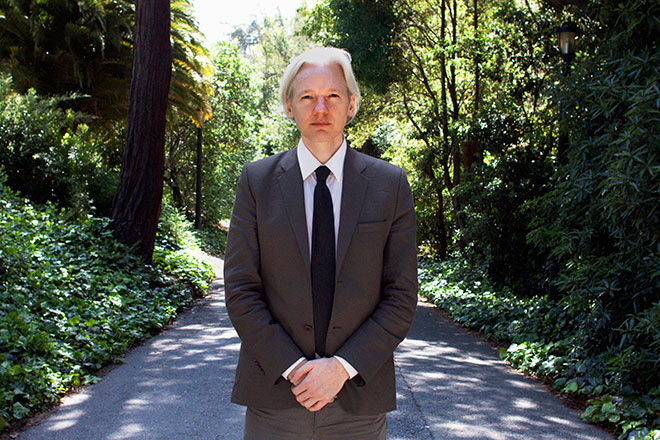
Monika Karbowska
(autotranslation with Deepl)
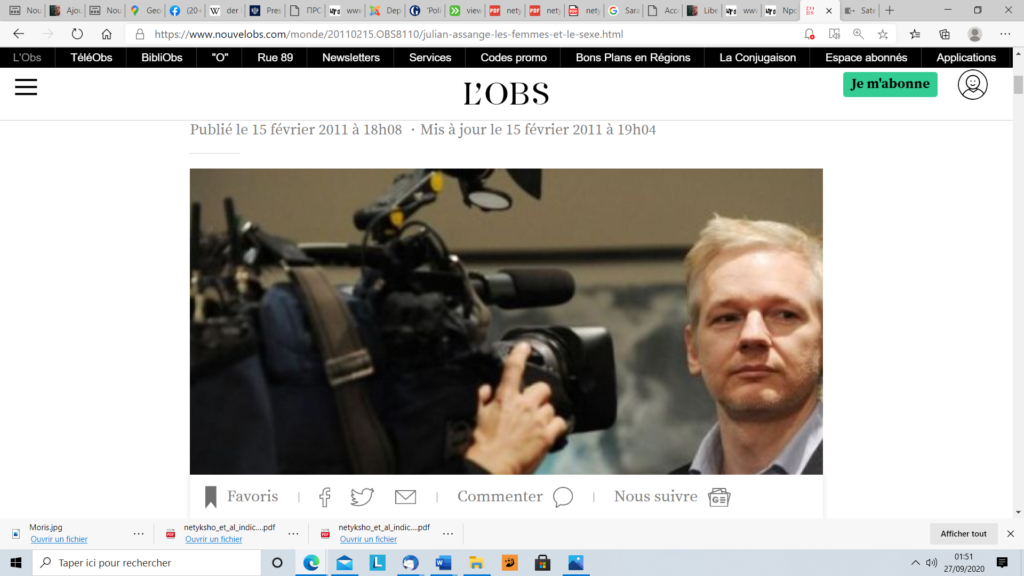
When we began, with Wikijustice Julian Assange, to analyze, 9 months ago, the whole history of « Wikileaks » and Julian Assange, we were struck by the suspicious deaths that mark the history of the whole struggle for the liberation of this political prisoner in the West: Seth Rich, John Johns, Michael Ratner, Adrian Lamo, Arjen Kamphuis… So many sudden deaths of people who were involved in Julian Assange’s revelations of state secrets or who sincerely wanted to help him! There are also people who have asked us if we are not in danger by taking too close an interest in the case. Naturally, the fight against the system is a risk. I know this better than anyone who lost my country, my best friends, in opposition to capitalism in Poland as early as 1991, when I was threatened by the bloodthirsty Ukrainian extreme right when I supported the families of the victims of the Odessa massacre on 2 May 2014. But we said to each other then: we are not isolated, we are part of the powerful Yellow Vests social movement. To silence us we would have to silence an entire country that stands up against the local, European and global oligarchy.
Yellow jackets on the way to the Revolution in Great Britain
Looking at the violence of the crisis we are going through in continental Europe and particularly in France, we could say to ourselves, three months before the end of the first phase of the trial at the Woolwich Court at the end of February, that we are not far from this scenario? Prohibition to leave one’s home under penalty of a police fine and prosecution, a halt to the economy and social ties, closure of all places of sociability, collective fear of dying from an unknown disease for which nothing has been prepared by the rulers…
The need for resourcefulness and self-management where people are still being treated, in hospitals and certain local health systems, to save the communes, departments and regions in general from a failing state capable only of repression… I’ll spare you the litany, you’ve been living it like me since mid-March.
Even the language used for us is the same as the torture Julian Assange endured. His « solitary confinement » in an apartment corresponds to our collective « confinement » in our homes…
Julian Assange’s latest trial hearings without activists’ scrutiny
In this debacle in my country, it has been impossible for us to attend the four trials of Julian Assange since the end of February, on 25 March, 7 April, 27 April and 4 May. It is certainly possible to travel from France to Great Britain because Eurostar puts tickets on sale every day and also to book a Paris-London on the liligo.fr website, but it was getting out of one’s house that had become difficult in France.
The information I have been able to obtain has been provided to me by the detailed accounts of the hearings written by the only journalist I consider to be doing substantive work, Marty Silk of the Australian Associated Press (who is to be commended for his work, by the way). Having been able to watch him work and watch him take notes a number of times, I know that he at least describes the proceedings fairly accurately. For example, I learned from the two hearings on March 25 and April 7 that an application for bail was finally filed by lawyers Fitzgerald and Summers, after so many months of prevarication, and that it was denied by Justice Baraitser on March 25. The bulk of the hearings on 25 March and 7 April, however, consisted not in arguments about the release, but in endless debates about the revelation of the identity of a new « companion » of Julian Assange and his two children. According to Marty Silk, it was rather the lawyers who constantly brought up the subject in a dramaturgy worthy of Paris Match, Gala or Voici when the judge and the prosecution were observing an obvious neutrality. Obvious because in a legal procedure only the identity of the litigant is known to the public attending the trial. The name of the husband/wife is known to the judicial institution since it concerns the civil status of the litigant and his family obligations which are part of his social situation, but it does not have to be delivered to the public. And a fortiori, the judge will never publicly disclose the names of the children of the litigant because this information is logically protected by the laws on the protection of children, personal privacy and data protection.
The colourful account of the « paparazzi who might sue the poor woman if her name were to be revealed to the public » and the fear of « kidnapping by the American secret service » left me, as is often the case, incredulous about the bizarre elements of this case. As already in 2019, I repeated to the activists that « if this woman lives in Great Britain, the British secret services know her perfectly and if they know her, the American secret services know her too ». It is unlikely that the CIA would take the risk of murdering or abducting a British woman and children on British soil. Despite all the disgust that this institution may inspire in us, it has never yet committed this kind of crime on the soil of its closest ally vis-à-vis British nationals because to do so would be diplomatically very risky for the US government. In any case, I had rather left to find Julian Assange’s girlfriend in France. Following the numerous public statements made by Juan Branco and Eric Dupont Moretti at the press conference of February 20, 2020 in Paris,[1] according to which Julian Assange was the father of a French child, activists regularly asked us this question: « Do you know who Julian Assange’s French wife is? ». No, I did not know, but I kept an option on this probability, knowing that it was credible that a computer activist like Julian Assange could have met a companion in France in the years 2005 to 2009 and that it would have been useful for us, activists, to have his open support in our struggle for Julian Assange’s political asylum in France.
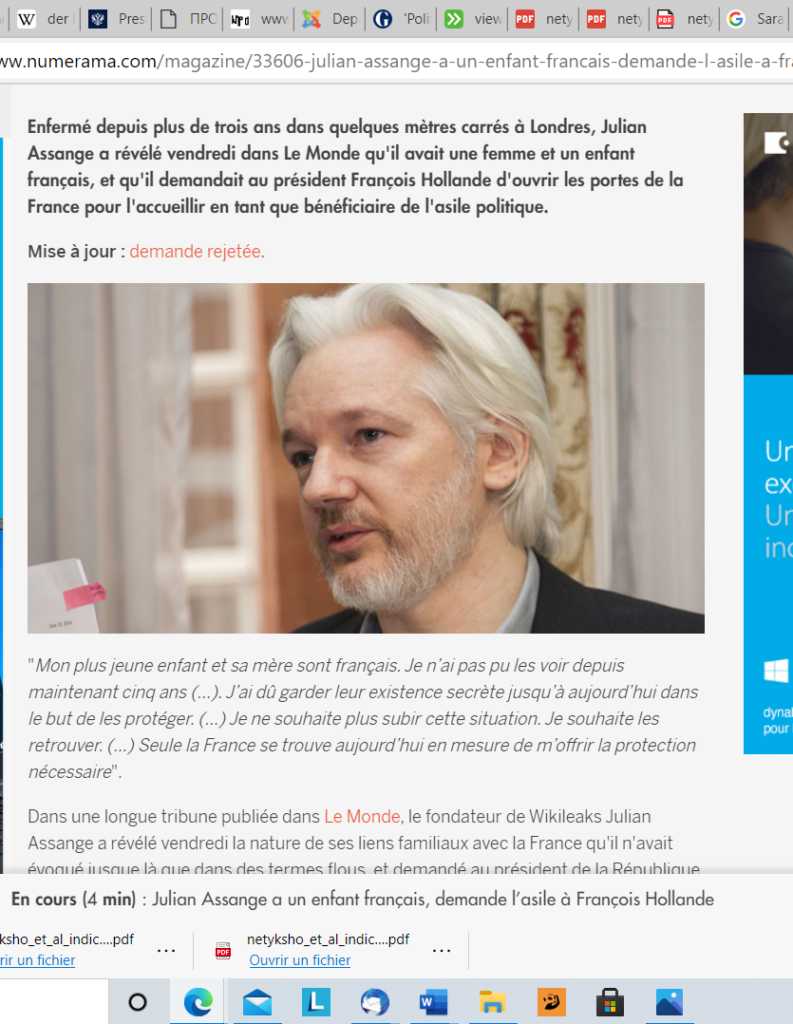
Stella Morris at the Daily Mail.
After years of trying at all costs to protect her identity and succeeding in spite of the « paparazzi », Stella Morris alias Sara Gonzales Devant or Stella Smith Robertson[2] is now putting herself and her children on stage with her face uncovered in front of the journalists of the tabloid « Daily Mail »[3] – I discovered the article on the evening of April 11th. The newspaper publishes a few photos, a fictionalized text and a video of Stella Morris with a cat and two children in a decor that resembles that of a computer workshop (equipment in boxes on shelves…) in which children’s toys have been placed.
This news prompts me to write here some reflections on the nature of the activism that I have carried out in recent months, for which I have taken many risks and experienced moments of great violence, as I have described in all my articles, on the trial of Julian Assange. Indeed, I have attended all of the hearings in Julian Assange’s trial since September 2019: September 20, October 11, October 21, 2019, November 18, December 13, December 19 and 20, 2019, January 13, 2020, January 23, 2020, February 19, 2020, February 24, 24, 26 and 27, 2020. After having put in so much effort, I feel justified in making a few remarks.
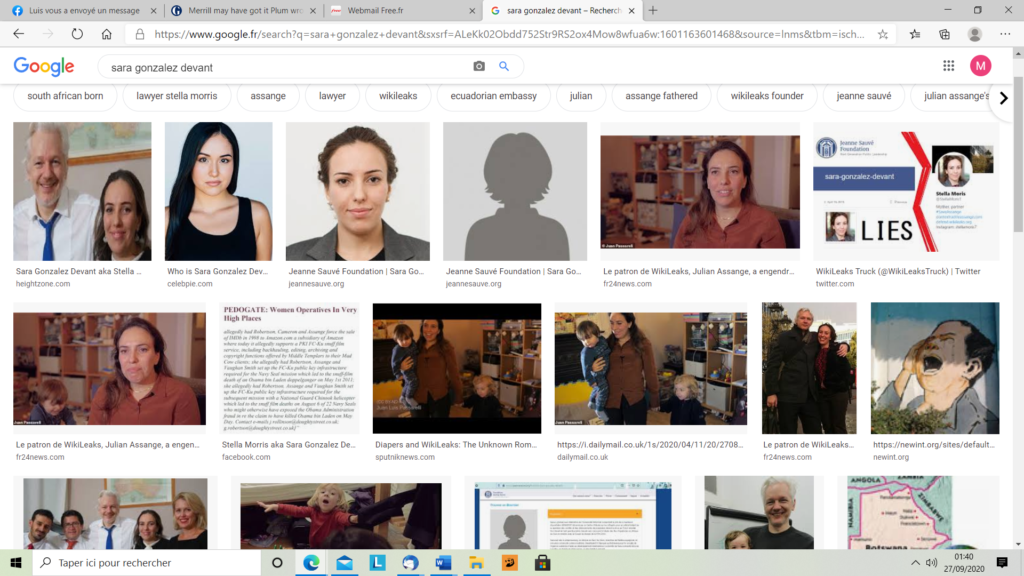
Similarly, it is unfortunate that no journalist questions and encourages the public to reflect on the credibility of a person who may have changed his or her first and last name three times in his or her life and who claims to be doing a job when there is no proof that he or she is capable of doing so. In western legal systems, it is very difficult to change one’s name and even more difficult to change one’s first name except in the case of marriage or naturalization. A special procedure requiring valid arguments is then necessary. If Sara Gonzales Devant, a specialist in the history of East Timor, is the same person as Stella Morris, legal advisor, then it is necessary to mention that « Stella Morris » is a pseudonym and to be accurate in the story so as not to mislead the public and activists.
It is unfortunate that the media portray Stella Morris or Sara Gonzales Devant or Stella Smith Robertson as a « barrister » when she is not a member of the British Bar, the Bar Council or the[4] Law Society[5] under any of her three names. She is not the only one: Jennifer Robinson and Geoffrey Robertson are also not registered with the British Bar, but the words are important, to say legal adviser or legal assistant would be more accurate. Of Julian Assange’s many « lawyers », only Jean Gareth Peirce and Alaistar James Lloyd Lyon are registered with the Law Society and Edward Hamilton Fitzgerald and Mark John Summers with the Bar Council.
Moreover, while Stella Morris portrays Julian Assange as both her client and her companion, reporters could also have concluded that Stella Morris does not respect the code of ethics of her profession when she is in the courtroom sharing her intimate life with the accused. If she is indeed the accused’s companion, her presence is a procedural defect that should have caused the hearings to be cancelled. To « defend » as a lawyer is to defend according to rules and a code of ethics that in most countries prohibit a lawyer from having close personal ties with his or her client. Moreover, the second procedural flaw is that if Julian Assange is indeed Stella Morris’s partner, she cannot remain her lawyer, since if she respected the rules she would not be able to plead and therefore represent him properly. Julian Assange would again find himself powerless because of a personal and legal imbroglio which could only once again be detrimental to him.
At all the hearings from 19 December 2019 to 27 February 2010 we noted the incongruous presence of very young people who obviously do not have a law degree and are not, of course, registered with the Bar Council or the Law Society. On 19 December, 13 and 23 January and 19 February 2020, it was the young hacker MC McGrath[6] who played the role of apprentice lawyer sitting on the defence bench at the Westminter Magistrate’s Court. On February 24, 25, 26 and 27, 2020, he was present next to Stella Morris and a bunch of teenage girls who were visibly bored during the long hours of the « trial of the century » and were playing on their laptops or pink computers. I know you have to see it to believe it, and as I have seen, having attended all these hearings, I encourage those who do not believe me to line up from 5 a.m. next time to see what is a strange sight far removed from what is expected of a serious political trial. From the audience gallery, I sometimes felt as if I was watching the dress rehearsal for a film shoot or a play with young extras, or an « in situ » exercise for young actors-in-training.
Stella Morris as Sara Gonzalez
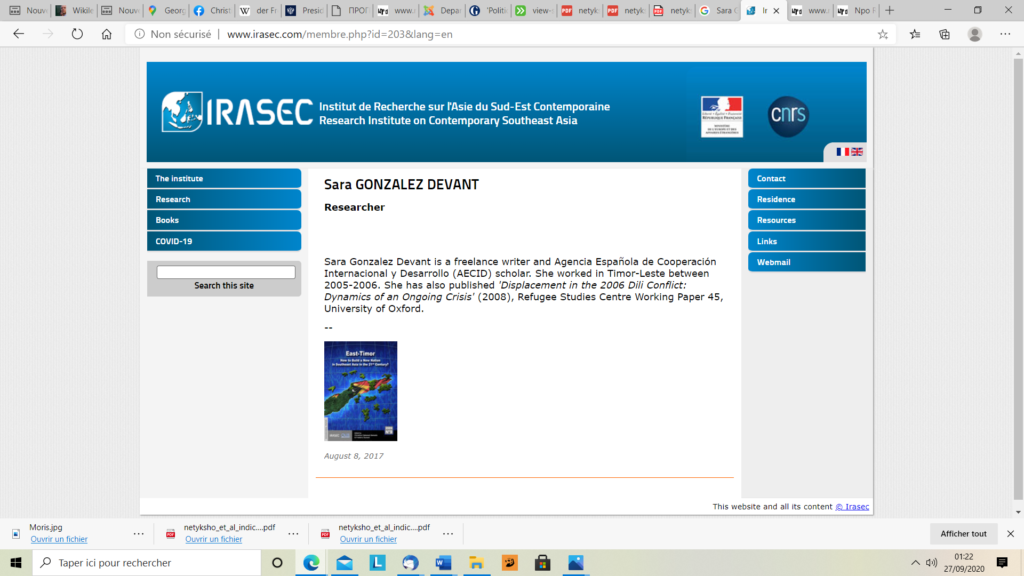
Sara Gonzalez Devant is apparently a graduate in political science (Department of International Development[7]) at Oxford University, specializing in the issue of refugees in East Timor[8]. She would have stayed in East Timor in 2005-2006 and would have written a dissertation for this faculty: this document is quoted in two academic books on the subject[9]. One of these academic books, edited by Jacqueline Aquino Sapiano, presents her as a scholarship holder of the « Agencia Espanola de Cooperación y Desarolla AECID », the Spanish governmental agency for international cooperation. The website of a British refugee aid organisation (Refugee Legal Aid Information) states that she would have been a consultant in East Timor for the United Nations High Commissioner for Refugees[10] and would have worked in 2010-2011 on the issue of transgenerational poverty for the Oversea Development Institute, a major international think tank working on the themes of migration, sustainable development and climate change and financed by British, American, Swedish and French government agencies as well as major companies[11].
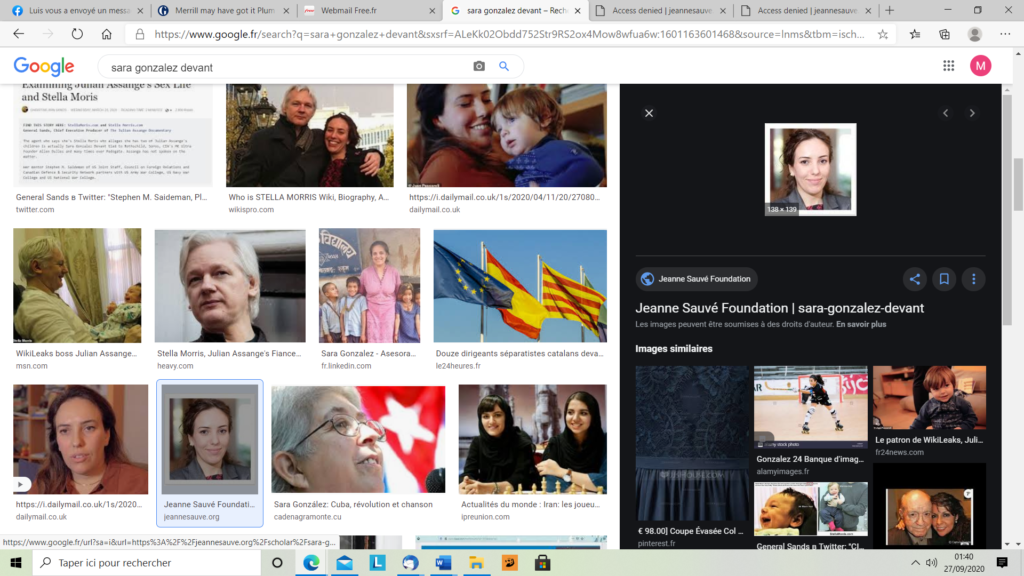
She was also funded by the Jeanne Sauvé Canadian Public Foundation « for Women’s Leadership » [12]but it is impossible to find details of her work or research. Sara Gonzalez Devant has written two articles on East Timor and one on Botswana on the specialized website « New Internationalist »[13] and has participated in a newsletter on the theme of refugee rights[go14].
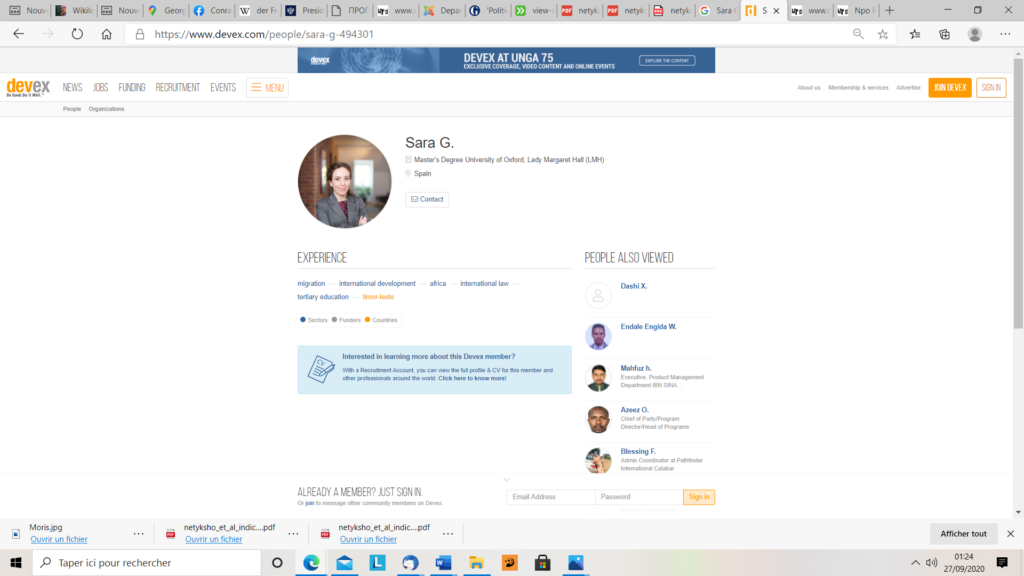
It is a very honourable professional background, but far removed from Swedish law on sexual violence or British law on extradition, which she claims to use to help Julian Assange as Stella Morris. As Sara Gonzalez Her professional career path also seems to stop in 2012.
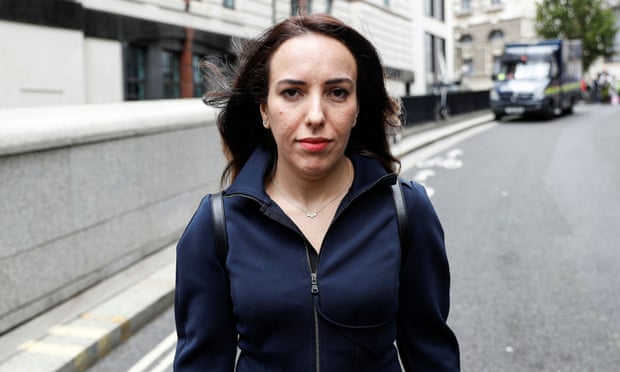
What really happened at 3 Hans Crescent for seven years?
Having known Mrs. Gonzalez devant under the name « Stella Morris » I will continue to use this pseudonym. Her account, in the first article of the Daily Mail, on April 11, 2010, inspires me to make the following reflections.
Having children in a heterosexual couple involves having sex. It is possible, of course, to have children in non-consensual sexual relationships, but Stella Morris shows us in her film the loving relationship she says she developed with Julian Assange. Having loving emotional and sexual relationships implies having a space of one’s own where this intimacy can blossom in confidence. It is also necessary to have a free and protected mental space to be able to create an ongoing relationship and focus on creating that relationship.
What we have been told, since 2012, about the life of Julian Assange in the apartment at 3 Hans Crescent Street belonging to the State of Ecuador is incompatible with the conditions necessary for an intimate and family life to flourish. Julian Assange would have been under constant surveillance by UC Global’s cameras placed from 2015 onwards in all spaces, including the bathroom and toilets, as Andy Müller Maguhn, Chairman of the Board of the Wau Holland Foundation,[15] shows in the film shown on 27 December 2019 at the Chaos Computer Congress and composed of these intrusive images stolen from Julian Assange’s private life[16]. According to the official narrative, which has been repeated so many times by the media and by « relatives », Julian Assange spent seven years confined to 5.5 square meters of a bedroom and an even smaller space in which his bed was placed, formerly a toilet[17]. Not exactly ideal conditions to develop a love life, as Stella Morris claims to have visited him every day from 2015 until April 11, 2019.
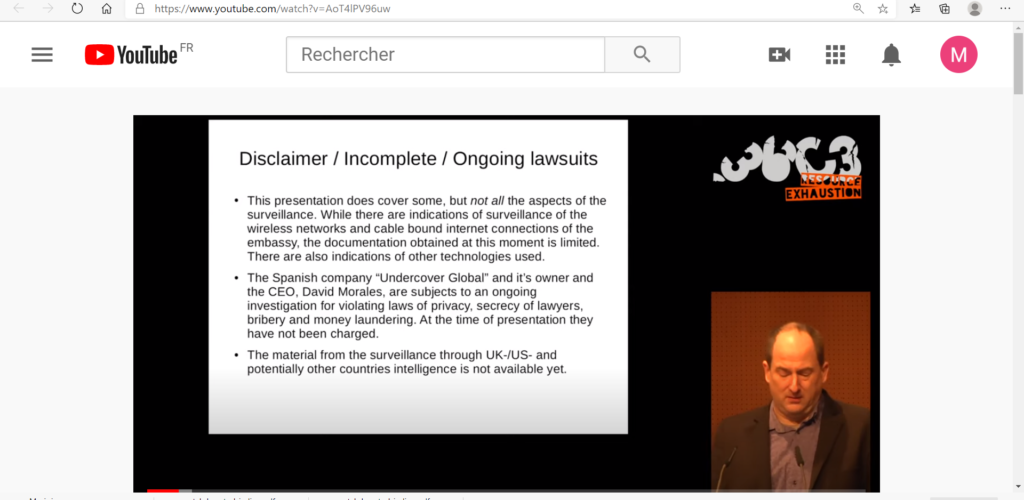
But perhaps we were simply lied to and Julian Assange’s life in Ecuadorian space was very different from what we were presented with?
The reality of the place at 3 Hans Crescent Street
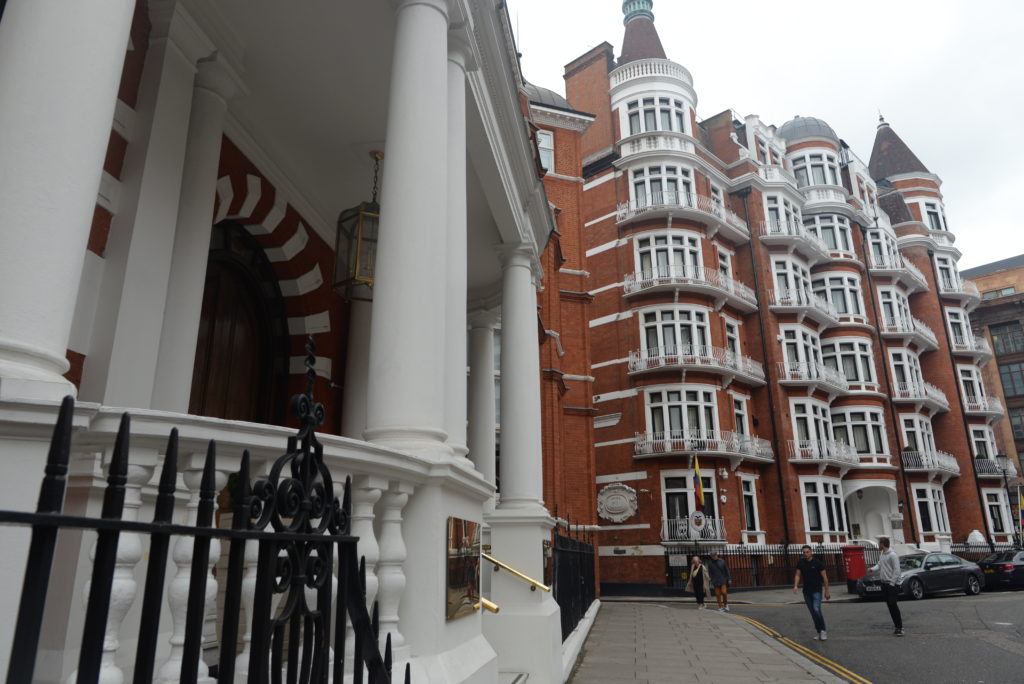
According to the land register, the building at 3 Hans Crescent Street is owned in absolute ownership (Freehold) by the Hans Crescent Freehold limited company (Document LN62660), located in a tax haven and owned by Mohammed bin Khalifa Al Nahyan, son of the President of the United Arab Emirates[18]. Ecuador, for its part, has had a « Leasehold » (a kind of very long-term lease) for Apartment 3B on the ground floor since 25 December 1976, with a storage room in the basement (Document NGL333924)[19]. This apartment is located on the left corner of the building when you stand in front of the entrance to number 3. One notices that only 3 windows (including the famous balcony where Julian Assange sometimes appeared and was filmed by the media and activists) look out onto Hans Crescent Street. The rest of the apartment, 5 windows, overlooks a small cul-de-sac, Landon Square. The Ecuador apartment has a large emergency exit immediately overlooking the dead end, perhaps a second one from the storage room, since there are two doors under the apartment at the end of the Landon Square dead end that allow you to go out of the « basement » (rather a « basement » – a room at ground level) of the building and go to the street or into the Harrods parking lot across the street.
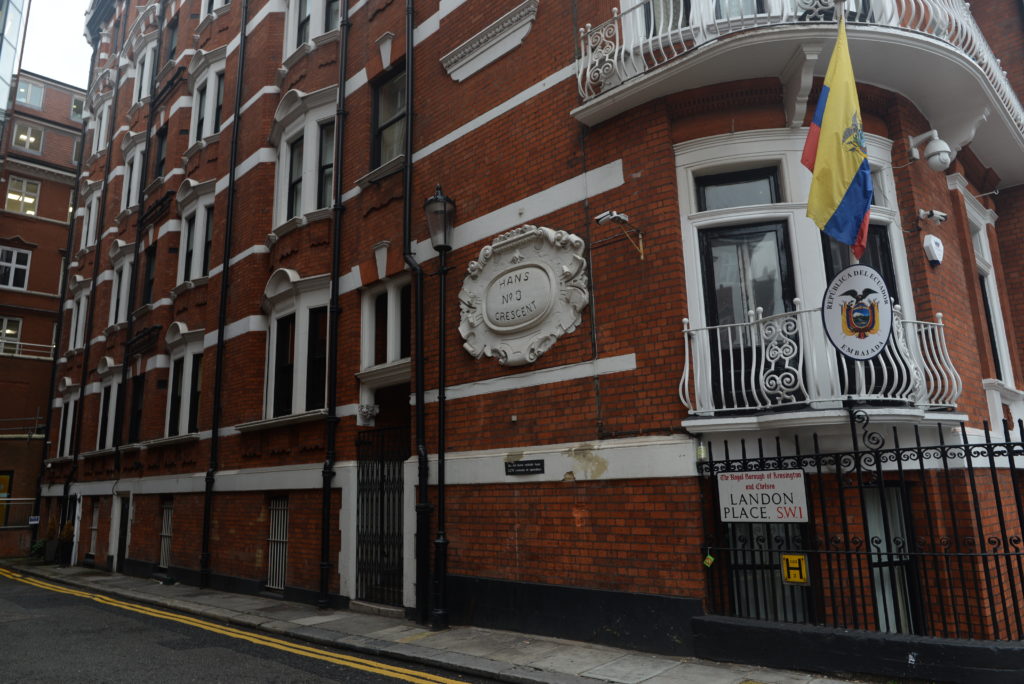
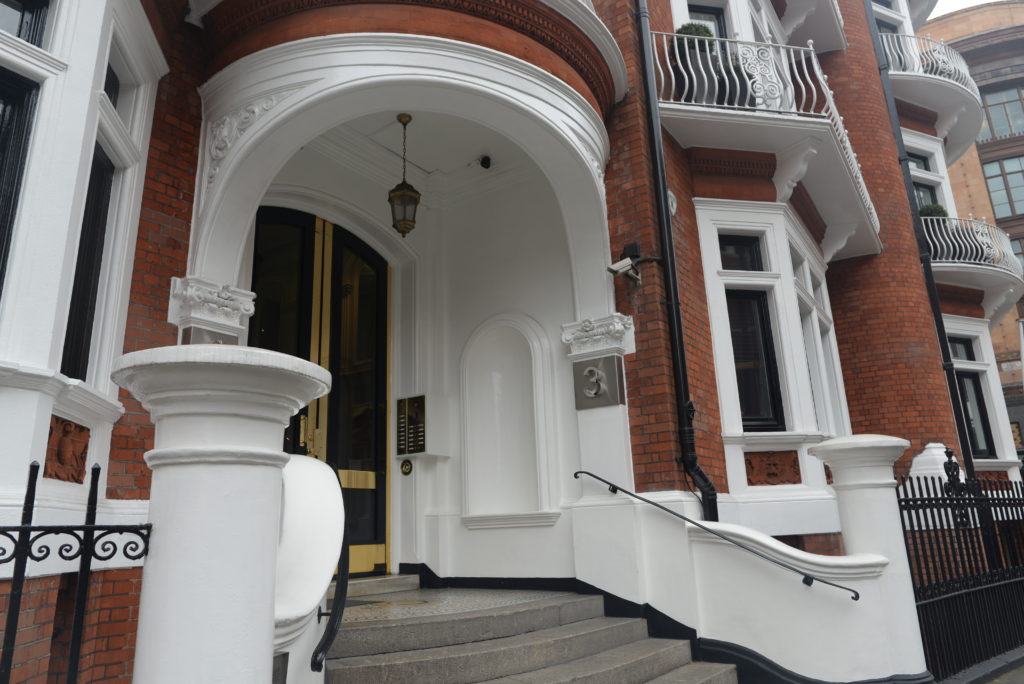
Right in front of the apartment, integrated in the same building complex, is the imposing entrance to the parking lot and the Harrods delivery tunnel (see photos)[20]. This entrance located at 1 Hans Crescent Street connects this car park and the delivery tunnel through the basement of the building to the Harrods store located to the right of the building complex at 3 Hans Crescent Street, on the Basil Street side. The Harrods car park therefore extends underneath the 3 Hans Crescent Street building complex and it is possible to exit through a second entrance on the other side of the building, next to the luxury pizzeria facing the Harrods, the only restaurant in the area. These entrances and tunnels under the building at 3 Hans Crescent Street are mentioned in the land register.[21]
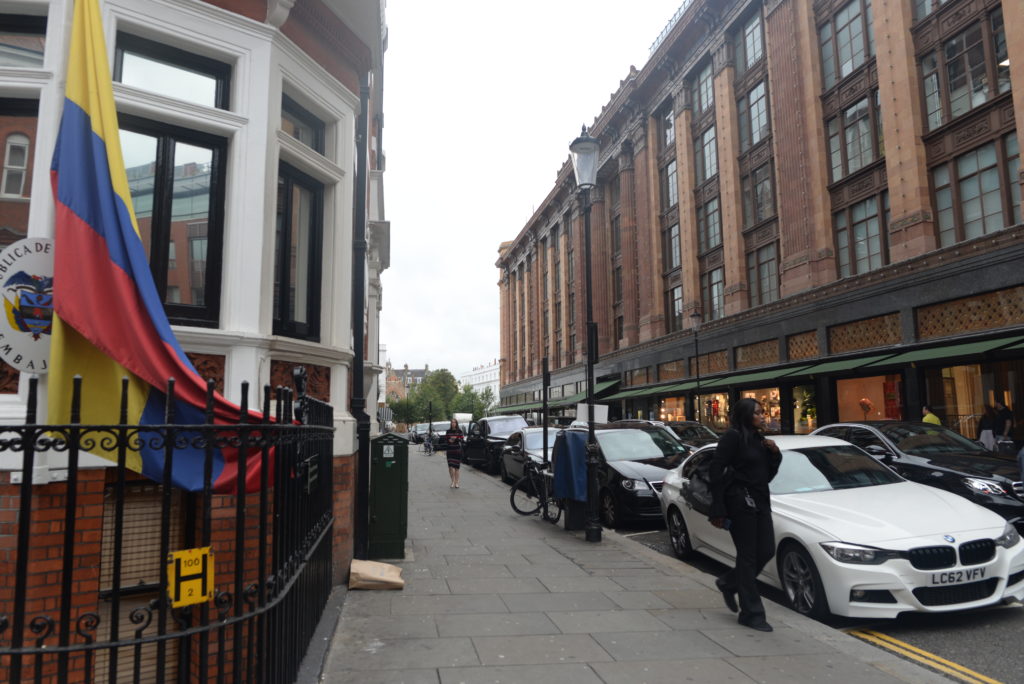
No wonder. Anyone who knows London knows that the area is full of World War II-era underground tunnels[22]. The underground car parks were, as early as the 1930s, the first part of the underground shelters for civilians during the Nazi bombings of London. A short distance from Hans Crescent Street is even the famous « 206 Brompton Road », the former underground station under which, during the war, the headquarters of London’s anti-aircraft defence was located! Property of the British Ministry of Defence, which kept the underground bunker as it was, the place was sold to the Ukrainian oligarch Dimitri Fyrtach at the height of the Ukrainian war against the Donbass in 2014[23]. As one of the richest and most powerful oligarchs in the country, and the sole owner of the Russian gas supply systems to the Ukraine, chemical plants and titanium import companies, Fyrtach is also closely linked to the British and American elites. During the war in Ukraine he was accused of having been too close to President Yanukovitsch, whom the Western powers initially pushed with the putsch of 21 February 2014. Since then, Fyrtach has been prosecuted for corruption but he remains the owner of the walls of the historic building while the British Minister of Defence retains ownership and control of the vast underground passages[24]. When the old bunker was put up for sale, history buffs were able to film what is the point of entry of a tangle of underground passages in this district steeped in a hard and heroic history[25]. These details are given to demonstrate that it is possible to enter the buildings of this historic district, go down into the basement inside and exit the building through another entrance, sometimes located in another building.
When he was forcibly removed from the premises at 3 Hans Crescent Street on April 11, 2019, Julian Assange held up a book by Gore Vidal in front of the cameras. Curiously enough, the American writer lived in his property at 31 Egerton Crescent just 500 meters from the Hans Crescent building complex, as he mentions in his autobiographical book « Palimpsest ».
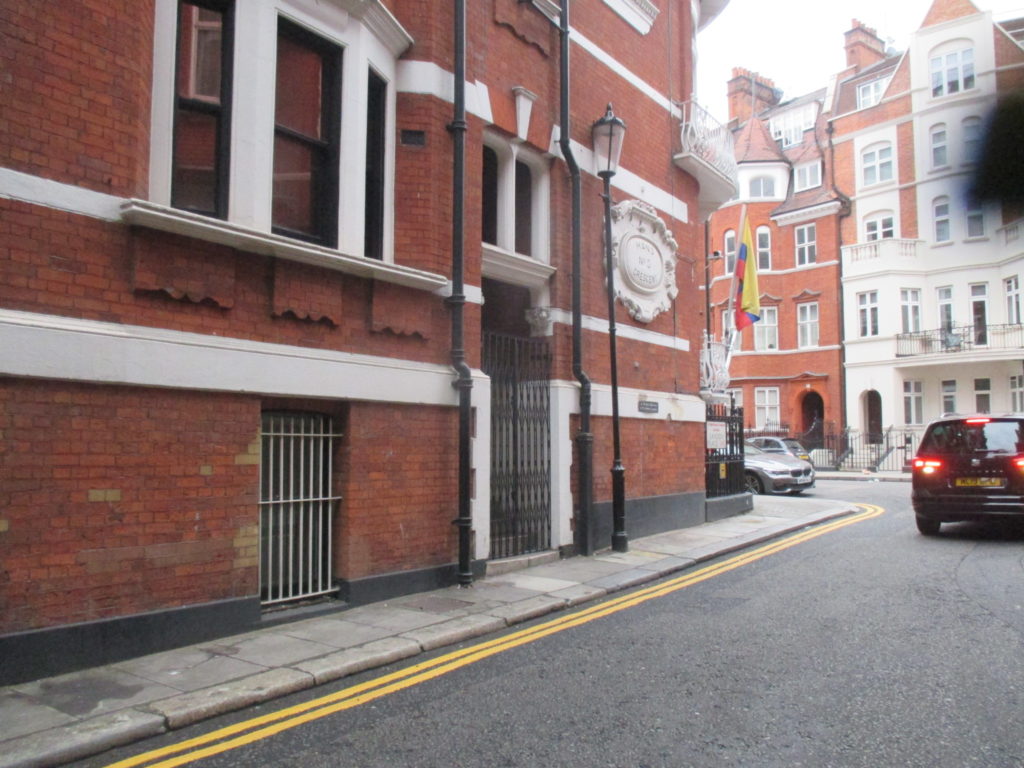
It is also known that the Embassy’st services moved in 2015 when the double-entry building at 6 James Sessions Square and 12 Buckle Street in Whitechapel was completed. It is here that Ecuadorian diplomats work, most likely from 2015, alongside their colleagues at the Consulate, as shown on the official Facebook page of the State of Ecuador in London, there is no other website[26]. The apartment at 3 rue Hans Crescent may have remained covered by diplomatic immunity and has since been used as a storage space, meeting and reception room, or simply as accommodation for diplomats or visitors to the mission.
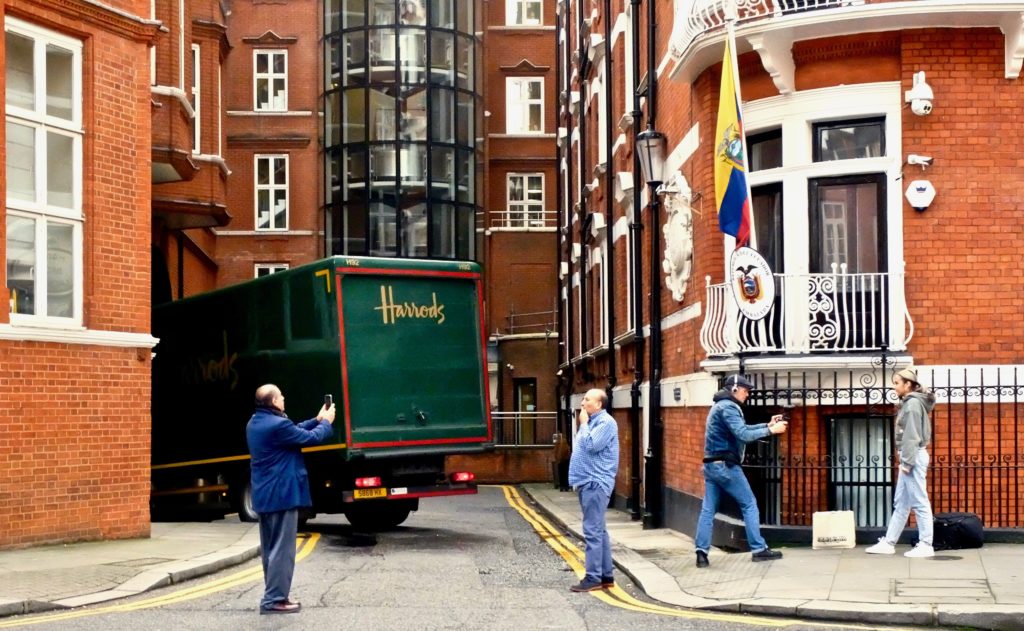
Moreover, if the story about cameras installed by the security officer of the diplomatic mission were true, it is not the custom of diplomats to work with surveillance cameras installed in their work station (and in the toilets of their workplace), cameras zooming in on secret defence documents… No real diplomat would accept this, if only because of the danger that these images could be stolen. Moreover, there is no need to spy on diplomats in their work, these people have already been chosen for their loyalty to the government in place. Today the apartment is empty and the security guard posted in the vestibule controls the entrances to both apartments, the one from Colombia and the one from Ecuador. Those curious about Ecuador are systematically directed towards 12 Buckle street.
Precisely, another embassy, which no media ever shows, the Colombian embassy is on the same floor of the ground floor of the building. The two missions are therefore adjoining; they share the same main entrance, the same staircase and the same narrow vestibule. This proximity is very surprising when one knows the deep hostility of the Colombian regime, closely associated with the domination of the United States over all Latin America, to any left-wing government in any country of the continent, including that of Correa. Observing these two flags, which are very similar, of Colombia on the balcony of the apartment on the right, and that of Ecuador on the balcony of the apartment on the left, the visitor always wonders how on earth Julian Assange could have felt safe in an apartment with windows, some of them exposed on a square, the others stuck at the end of a dead end and located on the same level as the headquarters of his worst enemies.
To conclude on the inconsistencies in the fable of the evil UC Global spying on the Ecuadorian diplomatic mission, it should be pointed out that a security agent officiating in the adjoining vestibule cannot filter the entries to the apartment from Ecuador without Colombia’s agreement as well. Otherwise, this would lead to serious diplomatic friction between two countries whose governments are ideologically hostile from 2007 to 2017. It is also clear that Ecuador, which only owns apartment 3B, did not have the right to control the entrances of the inhabitants of the other apartments in the 5-storey building. This requires the agreement of Hans Crescent Freehold limited, owner of the entire building. Either this filtering with passport control was decided by all the owners, or this story is a fake intended to raise the tension of the media spectacle.
Storytelling put to the test of diplomatic customs and realities
Guillaume Long, Rafaël Correa’s former Minister of Foreign Affairs, told us during the conference at the Sorbonne on September 25, 2019, that Ecuador has always respected the Swedish legal actions against Assange and has always negotiated with the United Kingdom during Julian Assange’s seven years of stay in Ecuador[27]. By saying this, he confirmed the doubts we had about the image of « the embassy under siege by the British police force, to the point that the ambassador cannot do his job ». The film « Risk » by Laura Poitras takes this dramatization to the extreme. However, Fidel Narvaez, consul and head of security at the place, is filmed talking (probably) to British authorities in June 2012 when Julian Assange walked through the door of the apartment at 3 Hans Crescent Street, but while he complains about a « disproportionate » number of police officers, he does not complain about the « siege » and even less about a state of war[28]…
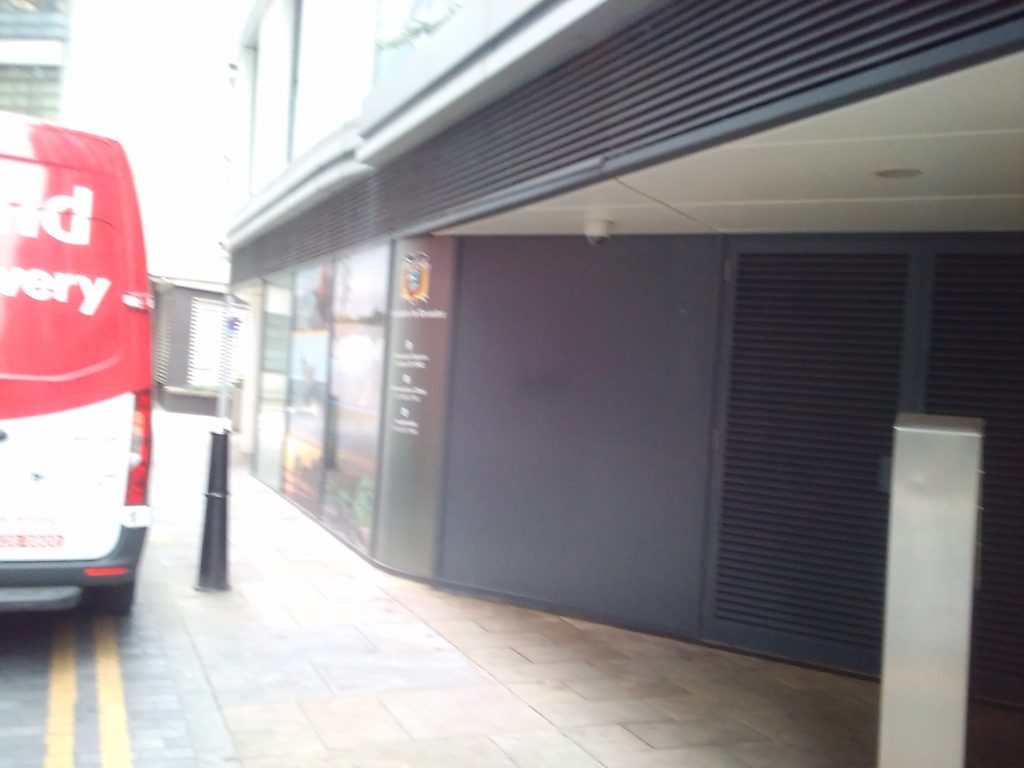
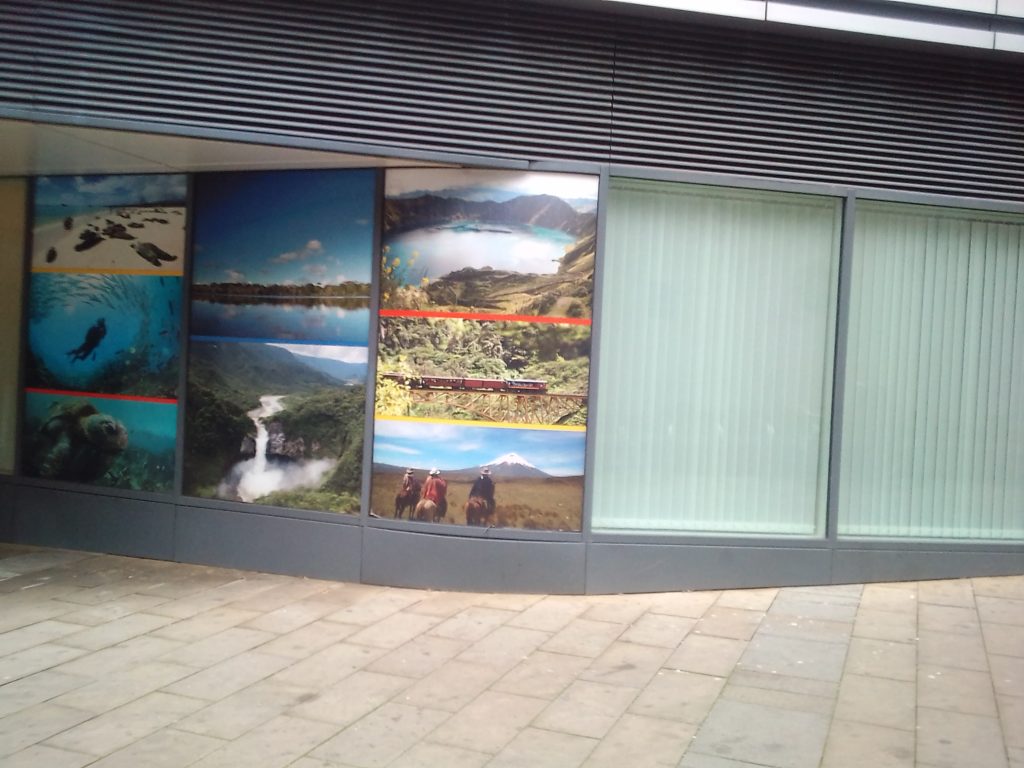
It must be understood that in history besieging a diplomatic mission has always been an act of war, which was therefore quickly resolved by a war between the parties (often after the express evacuation of personnel). The most emblematic case in the 20th century was the taking of American diplomats hostage in their mission in Tehran in 1979, in the context of the Islamic Revolution in Iran. Since 1979, it can be said that relations between the two countries have resembled hostile tension on the verge of war. There was no example in the 20th century or even before an embassy was besieged by the host country for 7 years. No professional diplomat believes the story told by the media of the ambassador being prevented from working in his mission and surrounded by the forces of the host country for 7 years in peacetime.
As I explained in a previous article[29], the Vienna Convention of 18 April 1961 establishes the principle of diplomatic immunity on the basis of the principle of reciprocity. It is through this principle of reciprocity and fear of reprisals against its own diplomats that the host country, even in the event of a deterioration in relations, refrains from hostile acts vis-à-vis the foreign mission on its soil. The principle of immunity, which requires that any intervention by the host country in the mission should only take place with the agreement of the highest authorities of the country concerned, i.e. the Minister for Foreign Affairs, lays down the condition for cooperation between the two countries to resolve any conflict between them. Clearly, it is impossible for British police officers to have « surrounded » the Ecuadorian Embassy without the agreement of Ecuador. It was rather a surveillance-protection measure granted precisely because of the Vienna Convention to Ecuador by the government of Great Britain, at Ecuador’s request, perhaps to keep away the curious who would like to get too close to the apartment 3 rue Hans Crescent to observe the reality of Julian Assange’s life there.
If Ecuador had really been « surrounded » and the work of its diplomats had been prevented, Ecuador would have been entitled to do exactly the same to the British diplomats posted in Quito. However, Raphael Correa was careful not to apply the principle of reciprocity against the British Embassy in his country. On the contrary, Ecuadorian-British relations certainly experienced some difficulties with the Assange question, but negotiations never ceased during this period[30]. The impasse was attributed to the incompetence of Ambassador Ada Alban, a close associate of Raphaël Correa but not a professional diplomat, who was in office from 2010 to 2013. The man who has been deciding on Julian Assange’s stay since April 2012 is Fidel Narvaez[31], consul since the beginning of Correa’s presidency, very politically linked to the president, and very probably, as is often the case with the posts of consul or vice-consul not well defined, his head of security. Curiously, Fidel Narvaez, presented as a close friend of Julian Assange, should, according to the customs of the milieu, have been persona non grata and immediately asked to return home after the expiry of his diplomatic immunity, if he had been responsible for the state of tension between his country and Great Britain. On the contrary, today Fidel Narvaez lives in Great Britain, where he has a residence permit. Having met him several times in the corridors of the Westminster Magistrate’s Court and having been able to talk to him, I did not get the impression that he is very worried about his situation as a « troublemaker » vis-à-vis Great Britain. On the contrary, he has attended Julian Assange’s hearings since 19 December 2019 and then the trial from 24 to 27 February 2020 at the Woolwich Crown Court, in the public gallery in the row reserved for the prisoner’s « family ». The British authorities do not seem to resent him for having been at the origin of a situation that was costly for them in media, political and financial terms and that generated heavy diplomatic problems. On the contrary, the British authorities have granted him the right to remain on their soil after his status as an Ecuadorian diplomat has ended. One more argument in favour of the hypothesis that the « siege » was a show for sensitive souls.
Storytelling versus real geopolitics
Not only has Correa’s Ecuador has not been at war with Great Britain during these 7 years, but it has continued to develop very profitable relations with the European Union and its countries throughout this period, especially with Germany. However, Great Britain was a member of the European Union at that time, and considering the role the Germans played in the Wikileaks project (the Wau Holland Foundation as owner and funder of the project and employer of Julian Assange in 2010-2012[32]), it is surprising that at no time did the German government play the good offices, as is usually done in the world of diplomacy, to resolve the « burning Assange conflict » between Ecuador, his new friend in Latin America,[33]and Great Britain, the third strongest power in the European Union. Rafael Correa’s government maintains privileged relations with Germany through the Friedrich Ebert Foundation, which specializes in relations between the German Socialist Party SPD and socialist networks and organizations around the world[34].
It is as if the « Assange case » was only hot for the media, which zooms in on the balcony with the Ecuadorian flag and removes the other elements of the decor from the field of vision: vans entering Harrods’ parking lot in front of the apartment, the Colombian embassy on the landing, the absence of any Ecuadorian diplomat in the whole neighborhood, of any Ecuadorian whatsoever, as ironically reported to me by the workers of the neighborhood.
In serious diplomatic channels, the Assange affair does not exist or is a marginal media epiphenomenon. I am sure that when we open the Foreign Office archives in 30 years there will be no record of the violent conflict between Ecuador and Britain over Julian Assange’s presence at 3 Hans Crescent Street. The absence of conflict does not mean that there were no negotiations about the fate of the « host » as UC Global officials spying on Assange on behalf of Correa and then Moreno called him. Julian Assange himself spoke of his hostage status in the negotiations between three countries, Ecuador, Great Britain and the United States during his last speech on the balcony on May 19, 2017. He appeared sad and defeated, evoking the violations of rights in the European Union while the British have just chosen the Brexit by referendum. He then mentioned the blackmail that Ecuador would suffer from the European Union which would penalize « Ecuadorian exporters » because of his case[35]. We Europeans experience in our lives how Germany decides almost all the policy of the European Union and the fate of its citizens. Does Julian Assange think of Germany as a stakeholder in the conflict that penalizes him without being able to express it clearly? No journalist has ever analysed his speech from this political angle, which is essential for understanding the situation. We will not know more, as Correa’s left-wing government is careful not to take public opinion as a witness and never reveals the true nature of its relationship with the Anglo-Saxon powers and with the European Union in the case of « Julian Assange ».
Nor did any journalist or analyst consider the interests that Wikileaks publications (such as the publication of the Vault 7 global surveillance files mentioned by Julian Assange in this 10-minute speech) could represent for Germany as a state in its relations with the United States, even though Merkel’s government had been very angry at the CIA’s spying on the Chancellor’s mobile phone. One hypothesis would be that the « Wikileaks » unveilings serve as leverage for Germany to put pressure on the United States and strengthen its independence from its powerful US allies.
In fact, on European soil, since the signing of the Vienna Convention, there have been no cases of flagrant violation of diplomatic immunity despite the conflicts and tensions that shake our continent. The only precedent resembling that of Julian Assange at 3 Hans Crescent Street would be that of Cardinal Mindszenty who took refuge in the American Embassy in Budapest after being released from prison by the Communist government in 1956. But if Mindszenty, an anti-communist activist, spent 15 years in the spacious American building in Budapest, it is because he refused to leave Hungary for the United States or the Hungarian communists would have preferred to send him away to prevent him from continuing his political action against them. Closer to home, the dreadful assassination of the Saudi journalist Jamal Khashoggi in his country’s consulate terrified diplomatic circles for whom a mission is a sanctuary. But it must be stressed that this despicable crime was facilitated by the permissive attitude of the host country, Turkey. Here again, cooperation between countries based on reciprocity played to the full, to the detriment of the most basic human rights.
We can deduce from this that Great Britain and Ecuador practiced for 7 years a form of agreement about Julian Assange and that Julian Assange was the only hostage of this negotiation. Germany also played a secret and important role that should be analysed.
Julian Assange’s identity
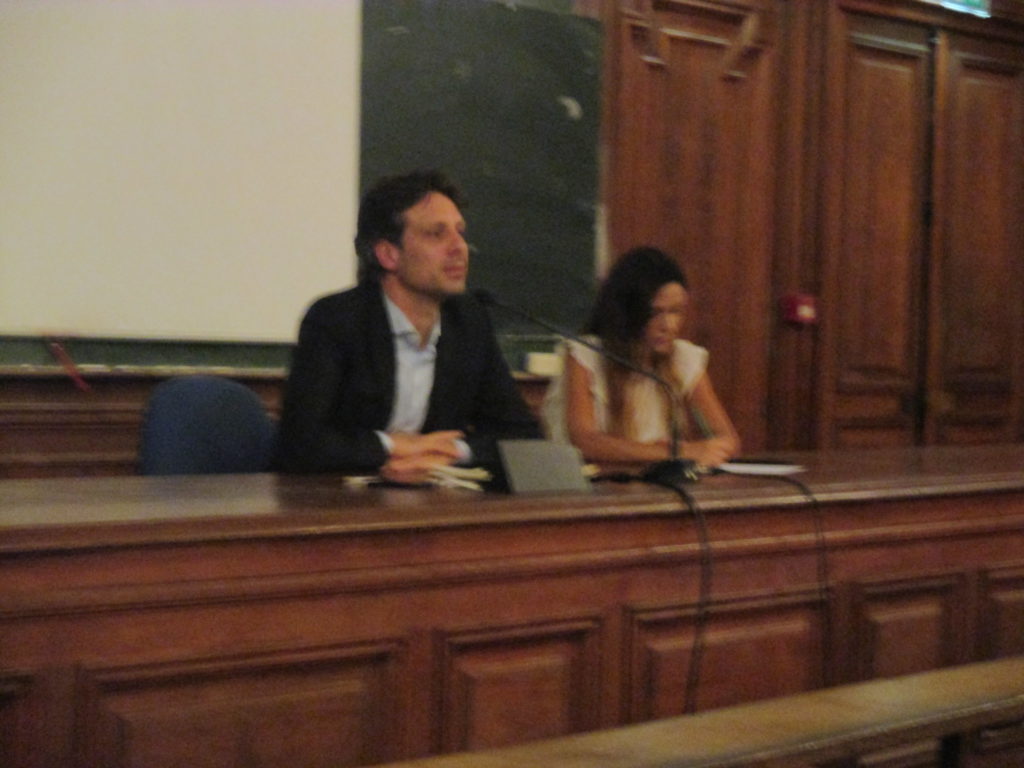
Did Julian Assange ever have Ecuadorian nationality and political asylum? The question is far from absurd. As for nationality, Guillaume Long, former Minister of Foreign Affairs under Rafael Correa from March 2016 to May 2017, answered our question on the subject during the conference at the Sorbonne on 25 September 2019. According to him, Maria Fernanda Espinoza, who heads this ministry after him, was not allowed to sign Julian Assange’s Ecuadorian naturalization document. This prerogative was reserved for the President of the Republic, Lenin Moreno, who never approved this decision[36]. Guillaume Long therefore considers this nationality to be false and therefore legally revocable. The document has not been published.
Worse, Julian Assange has never been able to show, in video or live, the document guaranteeing him political asylum in Ecuador – Ecuadorian residence permit or other. However, articles 27 and 28 of the Geneva Convention require the refugee to have an identity document that allows him to travel and establishes his identity with certainty, mentioning his exact name, date and place of birth and address[37]. The only document published by the media, the « Documento de Identitad de persono que ostendo proteccion international », bears Julian Assange’s photo but no other data required by the Geneva Convention, nor his signature[38]. This document was drawn up on 30 November 2016 by José Luis Jacome, Vice-Minister of Human Mobility under the responsibility of Guillaume Long. Jacome will remain in office after the election of Lenin Moreno in February 2017, while Maria Fernanda Espinoza, the new Minister of Foreign Affairs, declared in December 2018 that she had granted Ecuadorian nationality to Julian Assange. This loyalty of the Ecuadorian senior civil servant to the leader who revokes the nationality and asylum of a political refugee, in defiance of the Geneva Convention and the Universal Declaration of Human Rights, casts doubt on the reality of his support for Julian Assange under President Correa.
In addition, Guillaume Long also stated on 25 September 2019 that it is possible that Ecuadorian asylum was only guaranteed in 2012 on the basis of the Inter-American Convention on Human Rights, (article 22.7 and 22.8)[39] not the UN Geneva Convention on Refugees, which would explain why Britain does not recognise Julian Assange’s asylum. We can see that there is a significant lack of clarity regarding Julian Assange’s Ecuadorian political asylum and that these contradictions are detrimental to him.
In addition, on 15 and 16 November 2016, at a hearing with Swedish prosecutor Ingrid Isgren Julian Assange, he claims that he is an Australian citizen, that his passport was taken by the British authorities and that he cannot prove his identity. It is inferred that he does not possess any documents[40]. No one has ascertained the true meaning of these dramatic words and no journalist has asked for explanations. Firstly, when the British court granted him bail in December 2010, it should have returned his passport after he was released from the Wandsworth pre-trial detention centre. The confiscation of this passport is, in every respect, illegal under international law, and such experienced lawyers should have fought first to ensure that their client was not de facto stateless, in addition to being already an « undocumented migrant » (a residence card is compulsory for Australian citizens after more than 6 months in the UK). The fact that such an action against the British state was not taken for 6 years, until Julian Assange’s meeting with this Swedish prosecutor, says a lot about the inefficiency of the lawyers we have already denounced.
Secondly, it is surprising that Julian Assange « is not able to prove his formal identity » when, as a refugee under the protection of the Geneva Convention, he should have a document issued by Ecuador, proving his identity, his right to the protection of the State of Ecuador and his right to travel (as stipulated in articles 27 and 28 of the Convention). The Charter of the United Nations prohibits the revocation of a citizen’s nationality at birth and the fabrication of stateless persons. How is it that the senior Swedish official did not point out these flagrant violations of rights on the person of Julian Assange, violations committed by the British authorities, by the Australian authorities who must protect their citizens and by Ecuador which did not provide him with an identity document in accordance with the obligations of the Geneva Convention? Julian Assange in making this statement clearly called for the help of this person legally mandated by a State and likely to understand the kidnapping of which he is a victim.
What value can the work of « chief prosecutor » Ingrid Isgren have when she cannot record on the hearing report the surname, first name, place and date of birth, address, passport number and dates, place and authority of issue and expiry of Julian Assange’s legal identity document? Why did she not ask him about the Ecuadorian identity documents he should have? Why does she accept the illegality of the person she is interviewing, an illegality which she does not denounce?
Why is it that nobody notices that this essential data is missing from the Swedish file? The protagonists of the Swedish charges, complainants and witnesses, moreover, never seem to have presented any identity documents to the police and the courts because these documents are blank of any identifying number[41].
At the time, the Minister of Foreign Affairs was Guillaume Long and the President of Ecuador Rafael Correa. They are all as much responsible for Julian Assange’s inextricable situation as Lenin Moreno, whom it is so convenient to call the « villain » of the story. This storytelling technique allows to whitewash the personalities in power for 7 years and to contribute to reinforce the passivity of the citizen on the theme of « we can’t do anything against fate, the bad guys, Moreno and the Americans are too powerful ». This attitude of fatality is what we fight the most with Wikijustice.
The attitude of fate is alien to us because we are militants against the corrupt and dictatorial neoliberal capitalist system. But the further we go in our analysis, the more we discover, in the case of Julian Assange, that the political, legal and journalistic elites who are supposed to support him do so only lazily, at the last minute, without getting wet or are simply absent and silent. How can we accept the fatality of a trial played out in advance when, in theory, Julian Assange should benefit from the support of the powerful network of connections of his principal lawyer, the famous former judge Baltazar Garzon? Baltazar Garzon frequented 3 Hans Crescent Street because he was filmed dancing at a party in the apartment – this scene is immortalized in the film shown by Andy Müller Maguhn at the Chaos Computer Congress on December 27 last year[42]. However, Maitre Garzon has been conspicuous by his absence since Julian Assange’s incommunicado detention on April 11, 2019. He did not answer letters from European activists and did not attend the extradition hearings I have been attending in London since 20 September 2019. Admittedly, at the end of February 2020, he was present at the Woolwich Crown Court and was the only lawyer to shake hands with Julian Assange and talk to him. But he only remained at the trial for a day and a half, on 24 February and the morning of the 25th. Nor did he mobilize any Spanish politicians or activists for his client’s cause. Baltazar Garzon is very close to Reporters Without Borders, of which he was an active supporter during the time of Robert Ménard’s presidency, especially by being the honorary president of RSF’s internal legal support organisation Damocles, « charged with taking legal action to defend the freedom of journalists[43]. RWB was absent from the struggle for the release of Julian Assange in 2019 and only woke up for the trial in February 2020. Christophe Deloire, General Secretary of RSF France, and Christian Mihr for Germany, however, only stayed for one day at the trial, delegating the task of representation to Rebecca Vincent.
We often notice the present, rarely the absent. However, the absence of personalities at the very moment when we were able to observe the torture that Julian Assange is undergoing during the hearings contributes to the reinforcement of the feeling of powerlessness in the face of the fatality of the rights violations. Powerlessness that the dominant system wants to inculcate in us willingly or unwillingly.
Julian Assange’s alleged children before Stella Morris…
Returning to the testimony of Stella Morris on the intimate relationship she claims to have developed with Julian Assange from 2015, it is surprising that Julian Assange, in his interview with the doctors mandated by the Working Group on Arbitrary Detention of the United Nations High Committee for Human Rights and dated November 2015, already speaks of his children whom he cannot see growing up. So these are not the children that Stella Morris shows in the Daily Mail photos. The doctor who wrote the report « on the trauma and psycho-social situation of Mr. Julian Assange » mentions several interviews conducted from June 2014 to July 2015. This doctor speaks, on the contrary, of « young children in France as well as others in Australia with whom Mr. Assange cannot maintain an affective relationship in the embassy[44]. In addition, the report describes all the traumas caused by prolonged « confinement » in a place with no light, no possibility of going out, no exercise, and surrounded by a hostile environment (something that we are beginning to understand with the health violence that has recently been inflicted on us in France on a large scale): insomnia, anxiety, depression, loss of the ability to use one’s senses…
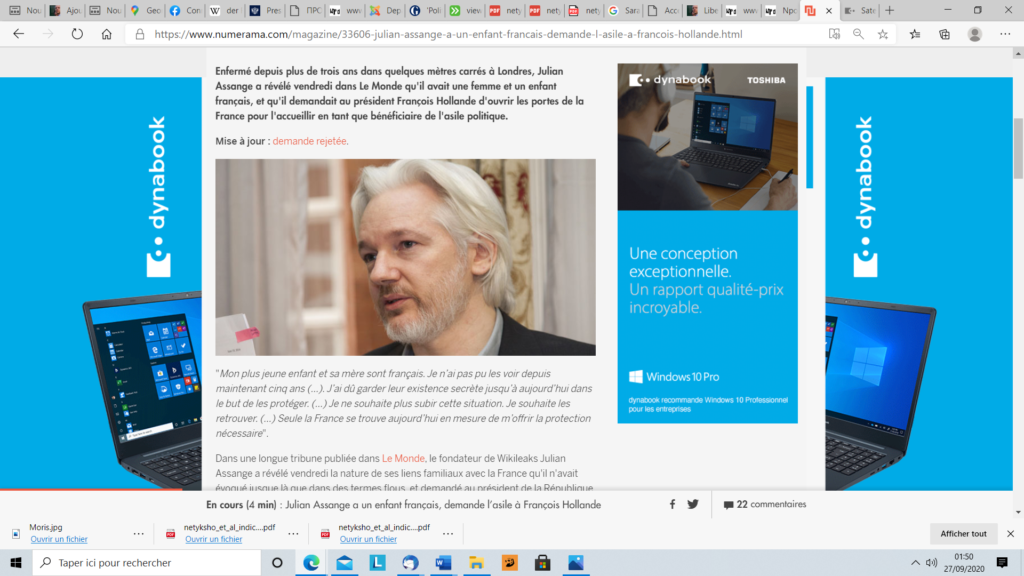
This « confinement » has been described as torture by Nils Melzer, the UN Special Rapporteur on Torture in his famous report on the situation of Julian Assange. Stella Morris’ rose-water novel currently in the media discredits Nils Melzer’s report and puts Julian Assange in danger. For how can a prisoner be both tortured and the happy father of a loving family?
Finally, driven into raptures by the images shown by Stella Morris, the audience is led to forget what Julian Assange himself said about his children in France and those in Australia. Citizens will know nothing about the mother of the latter, who is not present to support the father of her children. Yet, for human rights defenders, the question arises as to whether lawyers and the justice system have done everything possible to protect their interests both in terms of the legitimacy of their filiation and in terms of their property. Indeed, these children are heirs, like Stella Morris’ children, to dividends through the shares Julian Assange owns in the Icelandic company Sunshine Press Production[45]. The worrying question « who manages Julian Assange’s assets » must be asked by the activists so that Julian Assange is not robbed of his property during the long years of captivity he has suffered. Daniel Assange, portrayed by the media as his Australian son, now 31 years old, never came to the hearings and never defended his father either in front of the cameras or at a press conference. He never went to see his father in Belmarsh. It is now normal to have doubts about his existence. In 2010, this son was still tweeting about his father, since he disappeared[46]. None of the journalists chasing John Shipton in a pack have asked themselves the question of the son present in his father’s life in 2010 and absent in 2020.
Moreover, if this relationship began in 2015 when Julian Assange’s health was a concern, why hasn’t Stella Morris already sounded the alarm to save her companion? Why has she remained silent about the torture he is suffering, as demonstrated by Nils Melzer’s report and the three Wikijustice medical reports dated 29 December 2019, 8 February and 29 February 2020?[47]
Whoever does not denounce the crime, torture, is guilty of failing to assist a person in danger.
Article 1 of the UN Convention against Torture is very clear: anyone who consents to torture, [48]tacitly or with knowledge of it, is an accomplice to the crime:
Article 1 of the Convention against Torture
https://www.cncdh.fr/sites/default/files/cat_protocole_1.pdf
« «
1. For the purposes of this Convention, the term « torture » means any
act by which severe pain or suffering, whether physical or mental, is
intentionally inflicted on a person for such purposes as obtaining from him or
a third person information or a confession, punishing him for an act he or a
third person has committed or is suspected of having committed, to intimidate
or coerce her or intimidate or coerce a third person, or for any reason based
on discrimination of any kind, when such pain or suffering is inflicted by or
at the instigation of or with the consent or acquiescence of a public
official or other person acting in an official capacity. This term does
not extend to pain or suffering arising only from, inherent in or incidental to
lawful sanctions ».
[1] https://www.lepoint.fr/monde/dupond-moretti-veut-demander-l-asile-politique-pour-assange-a-emmanuel-macron-20-02-2020-2363736_24.php
[2] An article from an Australian media outlet that mentions the Smith Robertson identity: https://www.sbs.com.au/news/julian-assange-s-fiancee-publicly-joins-the-campaign-for-his-release
[3] https://www.dailymail.co.uk/news/article-8210957/WikiLeaks-boss-Julian-Assange-fathered-two-children-inside-Ecuadorian-embassy-lawyer.html
[4] https://www.directaccessportal.co.uk/search/1/barrister
[5] https://solicitors.lawsociety.org.uk/
[6] https://theintercept.com/staff/m-c-mcgrath/
[8] https://www.devex.com/people/sara-g-494301
[9] Sara Gonzalez Devant, « Displacement in the 2006 Dili conflict, dynamics of ongoing crisis », Refugee Studies Centrer Working Paper 45, 2008, University of Oxford. In Jacquline Aquino Sapiano, « East Timor, How to build a nationa in Southeast Asia in the 21 century », Proceedings of the 2006 Naples Congress, Institute for Research on Contemporary Southeast Asia, 2018 and in Vandra Harris, Andrew Goldsmith, « Security, Development and Nation Building in Timor Leste » Routledge, 2012.
[10] http://refugeelegalaidinformation.org/former-editors
[11] https://www.odi.org/sites/odi.org.uk/files/odi_funders_2017-18.pdf – the name of Sara Gonzalez Devant or Stella Morris does not, however, appear in the documents visible on the site.
[12] https://www.facebook.com/fondationjeannesauve/,
https://jeannesauve.org/scholar/sara-gonzalez-devant/sara-gonzalez-devant-2/
[13] https://newint.org/author/Sara%20Gonzalez%20Devant
[14]https://rightsinexile.tumblr.com/post/16854265845/a-monthly-forum-for-news-and-discussion-on-refugee
[15]
http://www.wauland.de/media/2016-12-31_jahresbericht.pdf http://www.wauland.de/media/2016-12-31_jahresbericht.pdf
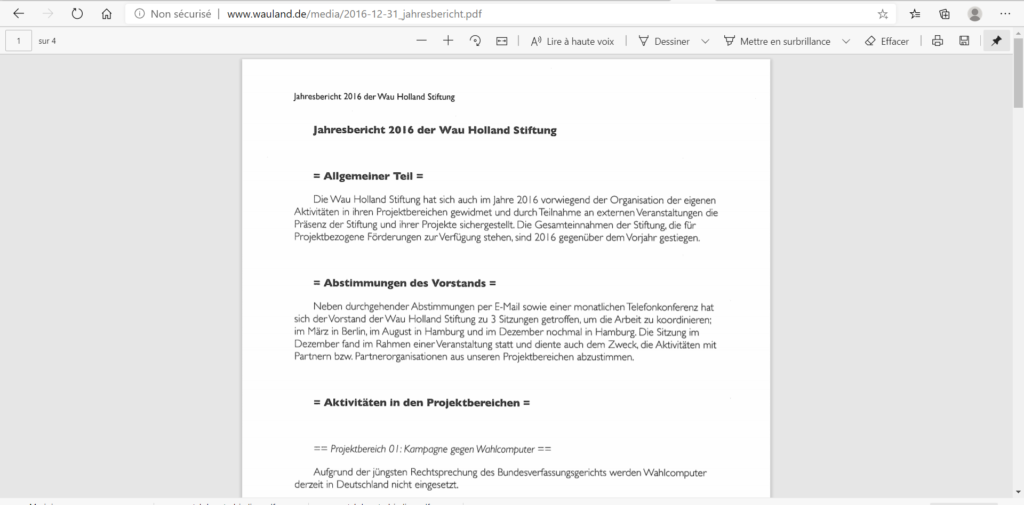
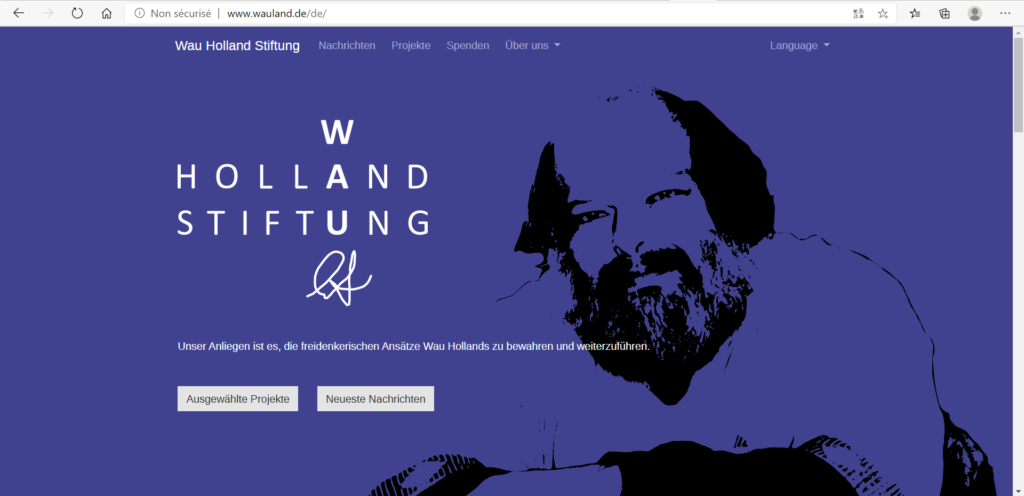
[16] https://media.ccc.de/v/36c3-11247-technical_aspects_of_the_surveillance_in_and_around_the_ecuadorian_embassy_in_london
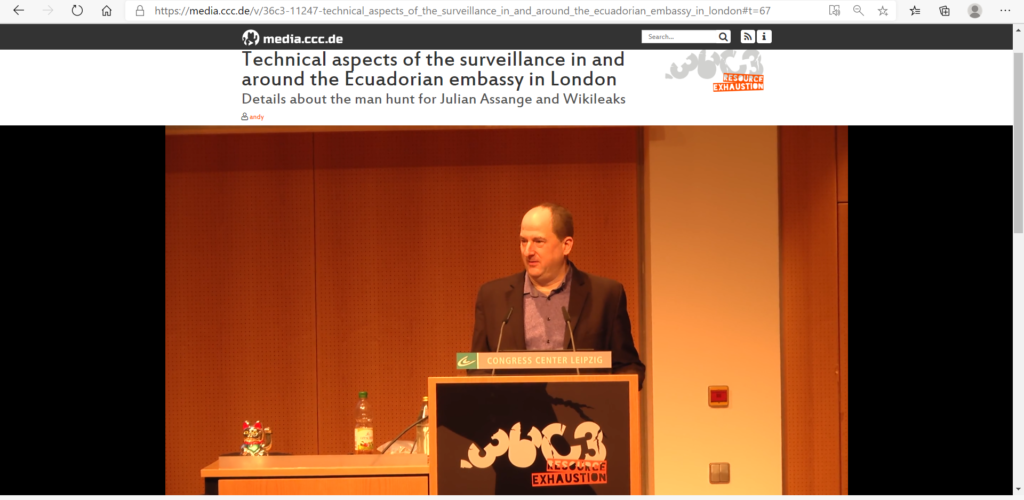
[17] https://www.lemonde.fr/idees/article/2015/07/03/julian-assange-monsieur-hollande-accueillez-moi-en-france_4668919_3232.html
www.slate.fr/story/126902/assange-colocation-equateur-ambass
[18] https://blogs.mediapart.fr/edition/liberez-assange-ethiques-et-medias/article/121219/assange-regression-feodale-au-royaume-uni
[19] Documents available on https://eservices.landregistry.gov.uk/eservices/FindAProperty/view/MapEnquiryInformationRequest.do
[20] https://www.facebook.com/media/set/?set=a.3154590997940931ype=3
[21] Document from HM Land Regiester: RegisterBGL5852 – 87-135 Brompton Road (SW1X 7XL) – Freehold », which is the cadastre for the Harrods store.
[22] Joshua Levine, « The secret history of the Blitz », Simon and Shuster UK, 2016,
Nick Cooper, « London Underground at war », Amberley Publishing 2014.
http://www.nickcooper.org.uk/subterra/lu/tuaw.htm
https://underground-history.co.uk/brompton.php
[23] https://en.wikipedia.org/wiki/Brompton_Road_tube_station
[24] Land Register LN43910
[25] https://www.youtube.com/watch?v=JEqKJDR7L0w
[26] https://www.facebook.com/ceculondres/
Before 2015 the Ecuadorian Consulate was located at 144, 146 Kings Cross road.
[27] Foreign Minister from 2016 until the election of Lenin Moreno, Guillaume Long, who also has French and British nationality, was the one who in October 2016 cut off Julian Assange’s internet access following the publication by « Wikileaks » of the emails of John Podesta, Hillary Clinton’s campaign manager.
[28] minute 54 :20
[29] http://www.defenddemocracy.press/monika-karbowska-faire-la-lumiere-pour-gagner-la-bataille-qui-sont-les-proches-de-julian-assange/
https://www.admin.ch/opc/fr/classified-compilation/19610070/index.html – the Vienna Convention
[30] Articles on the Ecuador – UK negotiations :
https://www.bbc.com/news/uk-22928276
https://www.bbc.com/news/uk-22816226
[31] https://www.bbc.com/news/uk-22928276
[32] http://www.wauland.de/media/2011_Jahresbericht.pdf
[33] Raphaël Correa’s visit to Germany in April 2013:
[34] https://amerika21.de/2013/03/81799/correa-besuch-deutschland
https://www.dw.com/de/correas-tipps-für-die-europäer/a-16752246
https://www.fes.de/referat-lateinamerika-und-karibik/suedamerika/ecuador
[35]https://www.youtube.com/watch?v=Kkx9_jf3FXw=117s ; 3 :40 minute
[36] https://www.numerama.com/politique/320190-lequateur-voudrait-bien-que-julian-assange-parte-de-son-ambassade.html
Note that in this article of January 10, 2018 Maria Fernanda Espinoza refers to the negotiations with Great Britain for an orderly solution to the Assange question.
[37] https://www.unhcr.org/excom/scip/3ae68cce4/identity-documents-refugees.html
[38] http://www.talkmedianews.com/the-world-in-2/2019/04/11/why-julian-assanges-impending-us-legal-battle-is-scaring-reporters/
« Identity document of a person who is guaranteed international protection. »
[39] https://www.cidh.oas.org/Basicos/French/c.convention.htm
[40] « I, Julian Assange, an Australian citizen, have had my passport taken by British authorities and so cannot provide formal identification »
https://justice4assange.com/IMG/html/assange-statement-2016.html
[41] Here are the originals published by journalist Al Burke on the Nordic News Network website. Notice the empty boxes for the ID numbers. That is to say that no hearing protocol contains this essential data, although it should have been marked and possibly hidden by the editor.
http://www.nnn.se/nordic/assange/docs/memoria.pdf
[42] https://media.ccc.de/v/36c3-11247-technical_aspects_of_the_surveillance_in_and_around_the_ecuadorian_embassy_in_london
[43] Page 77, Maxime Vivas, « Hidden face of Reporters Sans Frontières. From the CIA to the hawks of the Pentagon ». Editions Aden, Brussels 2007
[44] « Mr Assange has a young family in France, as well as children in Australia to whom he has been unable to have an affective relationship whilst in the Embassy; the uncertainty as to whether reunion can ever be accomplished, and whether the development of those relationships can be restored, creates a further uncertainty »
https://file.wikileaks.org/file/cms/Psychosocial%20Medical%20Report%20December%202015.pdf
[45] Icelandic Tax Office website: https://www.rsk.is/fyrirtaekjaskra/leit/kennitala/6110100280
[46] https://www.theatlantic.com/international/archive/2010/12/what-julian-assange-s-son-is-tweeting-about-his-dad/342931/
https://www.smh.com.au/technology/driven-to-dissent–like-father-like-son-20101204-18kpr.html
Twitt de Daniel Assange en 2010 : « Our final battle has begun, dad. We don’t cry, we don’t regret, and we never, ever give up. I love you more than anything and anyone in this world. I couldn’t ask for a better father, mentor, and role model in life. Thank you for everything. We fight to win. See you soon »